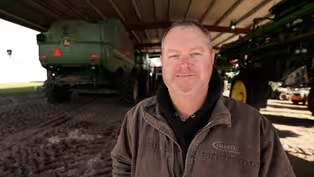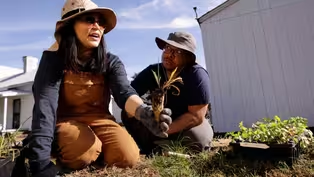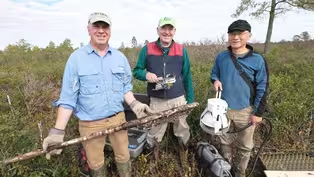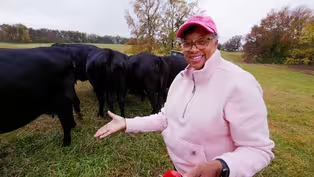
Trailer
Preview: Special | 59sVideo has Closed Captions
North Carolinians are using natural solutions to respond to our changing climate.
Carbon is the building block of all life on Earth. But excess carbon dioxide in the atmosphere is changing the planet’s climate. Natural solutions are being used across North Carolina to help pull this excess carbon out of the air and store it underground. "State of Change: Natural Solutions" premieres Wednesday, 4/19 on PBS NC & the PBS App. Learn more at pbsnc.org/StateOfChange.
Problems playing video? | Closed Captioning Feedback
Problems playing video? | Closed Captioning Feedback
State of Change is a local public television program presented by PBS NC
State of Change is part of the Pulitzer Center’s Connected Coastlines reporting initiative. For more information, go to https://pulitzercenter.org/connected-coastlines.

Trailer
Preview: Special | 59sVideo has Closed Captions
Carbon is the building block of all life on Earth. But excess carbon dioxide in the atmosphere is changing the planet’s climate. Natural solutions are being used across North Carolina to help pull this excess carbon out of the air and store it underground. "State of Change: Natural Solutions" premieres Wednesday, 4/19 on PBS NC & the PBS App. Learn more at pbsnc.org/StateOfChange.
Problems playing video? | Closed Captioning Feedback
How to Watch State of Change
State of Change is available to stream on pbs.org and the free PBS App, available on iPhone, Apple TV, Android TV, Android smartphones, Amazon Fire TV, Amazon Fire Tablet, Roku, Samsung Smart TV, and Vizio.
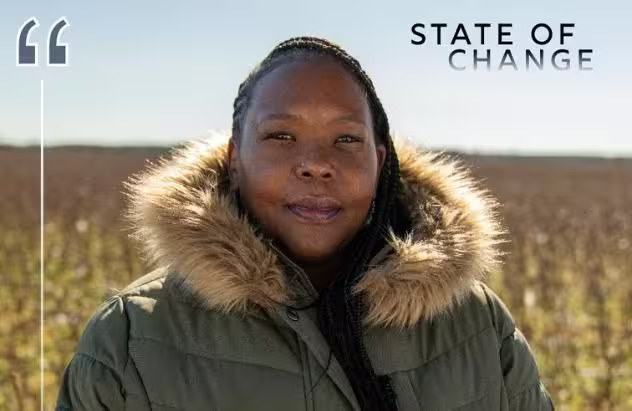
Explore More from State of Change
Hear from North Carolinians about climate change effects & innovative solutions across the state.- [Narrator] Carbon is at the heart of all life on Earth.
Although it's the building block of every living organism, excess carbon in our atmosphere has the potential to dramatically alter life on our planet.
- Carbon dioxide equivalents or greenhouse gases are the things that are causing our climate to become more unstable.
- [Narrator] Nature-based solutions are taking a front seat in North Carolina and across the globe as a way to pull excess carbon dioxide out of the air and store it underground.
- [Speaker X] We can actually do something that benefits local communities, benefits wildlife, but also stewards the land in a way that's addressing greenhouse gas emissions.
- It's an amazing amount of carbon that we can store in these systems.
- It's an easy solution.
We're not trying to, you know, build some machines that are gonna live and spin around in the ocean, right?
It's already here.
[light music]
Fighting Saltwater Intrusion in the Blacklands
Video has Closed Captions
Clip: Special | 9m 2s | Productive farmland in NC’s Tidewater region needs protection from rising sea levels. (9m 2s)
Planting Piedmont Grasslands Helps Fight Climate Change
Video has Closed Captions
Clip: Special | 8m 34s | Learn how planting native grassland plants mimics historical landscapes and stores carbon. (8m 34s)
The Potential of Pocosin Peatlands’ Carbon Storage
Video has Closed Captions
Clip: Special | 8m 25s | Trek into the coastal peatlands and learn how these unique landscapes store carbon. (8m 25s)
Thinking Outside the Box with No-Till Farming
Video has Closed Captions
Clip: Special | 8m 22s | Farmers and researchers in Reidsville see the positive impacts of no-till agriculture. (8m 22s)
Providing Support for PBS.org
Learn Moreabout PBS online sponsorshipSupport for PBS provided by:
State of Change is a local public television program presented by PBS NC
State of Change is part of the Pulitzer Center’s Connected Coastlines reporting initiative. For more information, go to https://pulitzercenter.org/connected-coastlines.
